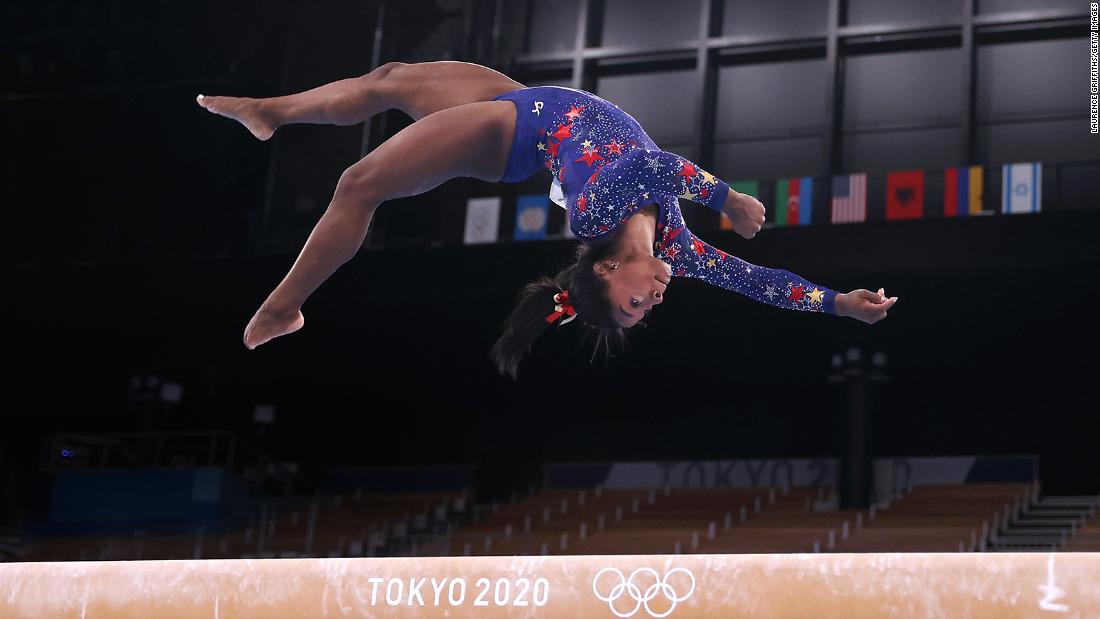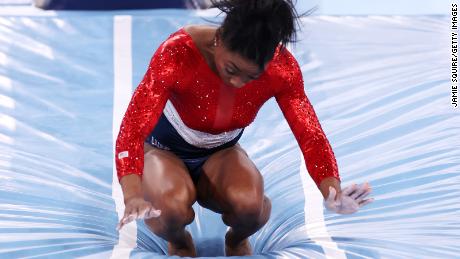Simone Biles and ‘the twisties’: How fear affects the mental health and physical safety of gymnasts
For every perfect, floaty flip performed in competition, there are thousands done in practice, many of them ending with scrapes, crashes, and haunting near-misses.
When Simone Biles scratched most of the Olympic team final, she said it was not because of a physical injury, but her mental health. This doesn’t mean she felt sad, or didn’t have her heart in it to compete. It means that her psychological state put her at significant physical risk. If her brain wouldn’t play along with what her body knows how to do, she could be seriously injured.
A Yurchenko with 1.5 twists is worth much less than an Amanar, so Biles scored just a 13.766. The US was a point behind Russia after vault, which is usually where the Americans secure a large lead. This made the possibility of winning gold very low, no matter how well Biles’s teammates rallied.
Biles pulled out of the rest of the team competition. “I just don’t trust myself as much as I used to,” Biles told reporters in Tokyo. “I’m a little bit more nervous when I do gymnastics. I feel like I’m also not having as much fun.”
USA Gymnastics said it supported her decision “wholeheartedly,” adding in its statement that Biles would be assessed every day.
A case of the ‘twisties’
She had to relearn it, starting with a simple half twist on floor. “I started to learn the twist again like a small child.” In 2016, she won an Olympic bronze medal on vault.
Her natural talent is why her missed vault is so stunning. But her decision to scratch makes a lot of sense. When the twisties set in, it’s hard to know when they’ll go away. But Biles’s decision to protect herself marks a shift from the old way gymnastics worked in the US.
“We also have to focus on ourselves, because at the end of the day we’re human, too,” she said. “So, we have to protect our mind and our body, rather than just go out there and do what the world wants us to do.”
Bailing, balking and headcases
Some more slang: bailing is when you pop out of a skill in the middle of it before you’ve done the whole thing — like doing a single flip instead of a double. Balking is when you hesitate or stop doing the skill before it’s really begun — especially dangerous on backward flips, because often the momentum is not stopped but slowed, and can make you crash onto your neck or head. (Baseball has this term too, but it tends to come with less risk to the spine.) A mental block is when one skill becomes a fixation, and you can’t make yourself do it, even if it’s relatively easy. A headcase — which is almost a slur in gymnastics — is a talented gymnast who melts down in competition.
At the 1996 Olympics in Atlanta, Kerri Strug landed a vault on one leg as the US won its first-ever team gold medal in gymnastics. This is remembered by regular people as a glorious moment of sports heroism, but on the gymternet, the take is more nuanced. The US didn’t actually need Strug’s score to win the gold.
The most influential gymnastics coverage comes not from NBC broadcasts, but from the podcast Gymcastic, which since 2012 has been relentless in pushing radical ideas like that psychological abuse of athletes is bad, that taking care of your mental health is important, and that elite gymnasts are not fat just because they have breasts.
“It’s the Olympic Games,” Biles told the press, “But at the end of the day, it’s like, we want to walk out of here, not be dragged out here on a stretcher.”
![]()












